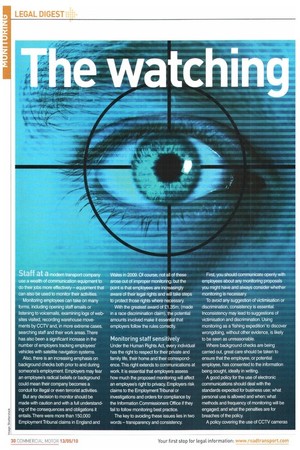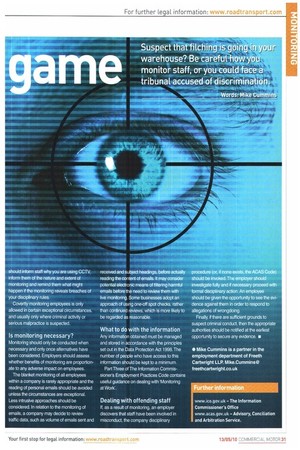he watching
Page 30

Page 31

If you've noticed an error in this article please click here to report it so we can fix it.
Suspect that filching is going in your warehouse? Be careful how you monitor staff, or you could face a tribunal accused of discrimination.
Words: Mike Cummins Staff at a modem transport company use a wealth of communication equipment to do their jobs more effectively equipment that can also be used to monitor their activities.
Monitoring employees can take on many forms, including opening staff emails or listening to voicemails, examining logs of websites visited, recording warehouse movements by CCTV and, in more extreme cases searching staff and their work areas There has also been a significant increase in the number of employers tracking employees' vehicles with satellite navigation systems.
Also, there is an increasing emphasis on background checks both prior to and during someone's employment Employers may fear an employee's radical beliefs or background could mean their company becomes a conduit for illegal or even terrorist activities But any decision to monitor should be made with caution and with a full understanding of the consequences and obligations it entails. There were more than 150,000 Employment Tribunal claims in England and Wales in 2009. Of course, not all of these arose out of improper monitoring, but the point is that employees are increasingly aware of their legal rights and will take steps to protect those rights where necessary.
With the greatest award of £1.35m, (made in a race discrimination claim), the potential amounts involved make it essential that employers follow the rules correctly.
Monitoring staff sensitively Under the Human Rights Act, every individual has the right to respect for their private and family life, their home and their correspondence. This right extends to communications at work It is essential that employers assess how much the proposed monitoring will affect an employee's right to privacy. Employers risk claims to the Employment Tribunal or investigations and orders for compliance by the Information Commissioners Office if they fail to follow monitoring best practice.
The key to avoiding these issues lies in two words transparency and consistency. First, you should communicate openly with employees about any monitoring proposals you might have and always consider whether monitoring is necessary.
To avoid any suggestion of victimisation or discrimination, consistency is essential. Inconsistency may lead to suggestions of victimisation and discrimination. Using monitoring as a 'fishing expedition' to discover wrongdoing, without other evidence, is likely to be seen as unreasonable.
Where background checks are being carried out, great care should be taken to ensure that the employee, or potential employee, has consented to the information being sought, ideally in writing.
A good policy for the use of electronic communications should deal with the standards expected for business use, what personal use is allowed and when, what methods and frequency of monitoring will be engaged: and what the penalties are for breaches of the policy.
A policy covering the use of CCTV cameras should inform staff why you are using CCTV, inform them of the nature and extent of monitoring and remind them what might happen if the monitoring reveals breaches of your disciplinary rules.
Covertly monitoring employees is only allowed in certain exceptional circumstances. and usually only where criminal activity or serious malpractice is suspected.
Is monitoring necessary?
Monitoring should only be conducted when necessary and only once alternatives have been considered. Employers should assess whether benefits of monitoring are proportionate to any adverse impact on employees.
The blanket monitoring of all employees within a company is rarely appropriate and the reading of personal emails should be avoided unless the circumstances are exceptional. Less intrusive approaches should be considered. In relation to the monitoring of emails, a company may decide to review traffic data, such as volume of emails sent and received and subject headings, before actually reading the content of emails. It may consider potential electronic means of filtering harmful emails before the need to review them with live monitoring. Some businesses adopt an approach of using one-off spot checks. rather than continued reviews, which is more likely to be regarded as reasonable.
What to do with the information
Any information obtained must be managed and stored in accordance with the principles set out in the Data Protection Act 1998. The number of people who have access to this information should be kept to a minimum.
Part Three of The Information Commissioner's Employment Practices Code contains useful guidance on dealing with 'Monitoring at Work'.
Dealing with offending staff
If. as a result of monitoring, an employer discovers that staff have been involved in misconduct, the company disciplinary procedure (or, if none exists, the ACAS Code) should be invoked. The employer should investigate fully and if necessary proceed with formal disciplinary action. An employee should be given the opportunity to see the evidence against them in order to respond to allegations of wrongdoing.
Finally if there are sufficient grounds to suspect criminal conduct then the appropriate authorities should be notified at the earliest opportunity to secure any evidence. in • Mike Cummins is a partner in the employment department of Freeth Cartwright LLP. Mike.Curnmins@ freethcartwrightco.uk
































































































































